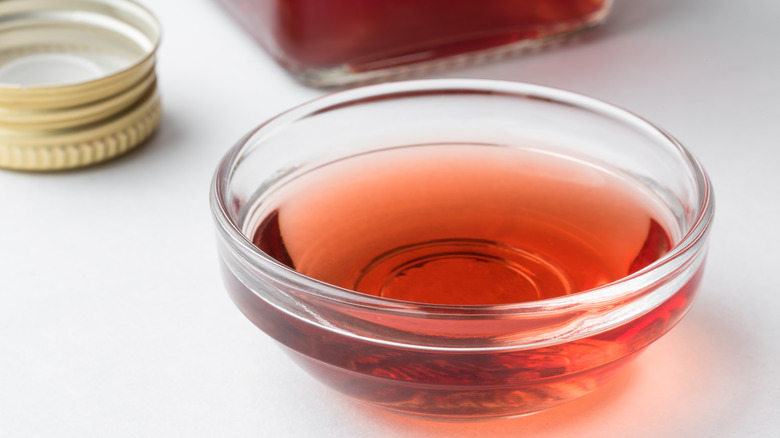The Closest Red Wine Vinegar Substitute For Your Cooking Needs
A good red wine vinegar substitute isn't something to take too lightly because it has one of the stronger, more distinct flavors of your standard vinegar options. Unlike white wine vinegar or rice vinegar, which offer more subtle flavors with their acidic punch, the red wine version follows in the footsteps of the liquid it's born from by bringing more noticeable fruit notes to dishes. It still has a kick, but it's a bit more balanced and complex than many other vinegar options. This means that when you use red wine vinegar you really are going to taste it; it's not just a neutral way to boost other flavors. So when you're looking for a red wine vinegar substitute you need to find something that is going to mimic everything it does pretty closely.
It may sound too obvious to work, but the best answer when you run out of red wine vinegar is to mix normal red wine and white wine vinegar. Red wine brings the flavor notes of red wine vinegar, while the white wine vinegar will bring the sharpness. You can mix them together equally to get an ingredient that shouldn't alter your recipe in any meaningful way. A mixture that is only half vinegar will be a little less tangy, but unless it's a recipe that calls for a huge amount of vinegar, the difference shouldn't be too noticeable.
White wine vinegar and red wine can substitute for red wine vinegar
Both red wine and white wine vinegars are just the oxidized children of their parent wines, so red wine can recreate the lightly sweet, more robust taste of red wine vinegar. It also helps that the next best substitute for red wine vinegar is just white wine vinegar. White wine vinegar isn't as flavorful as red wine, but it still has a little sweetness and some of that fermented wine complexity. It's close enough to its relative that a splash of red wine is all it needs to copy it, but if you don't have any wine on you either, it can get the job done on its own with minimal changes to your meal.
After that you may need to adjust other parts of your recipe if you're switching to another vinegar. Sherry vinegar and balsamic vinegar are both sweeter than red wine. They can work in a pinch, especially if it's a small use situation like brightening up a stew or helping deglaze a pan, but you should look for a way to lighten up the sweetness in other areas to balance it out. Rice vinegar is both more mildly flavored and lighter in acidity than red wine vinegar, so it's not really ideal unless you have no other options. As much as they may seem similar, there are real differences in vinegars, so stay stocked on the essentials and you won't have to compromise.

